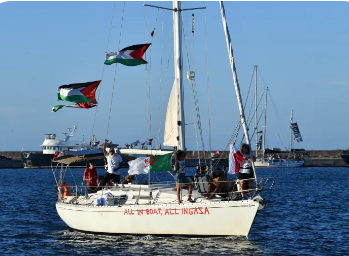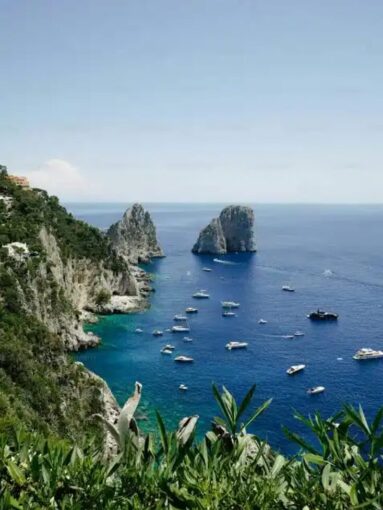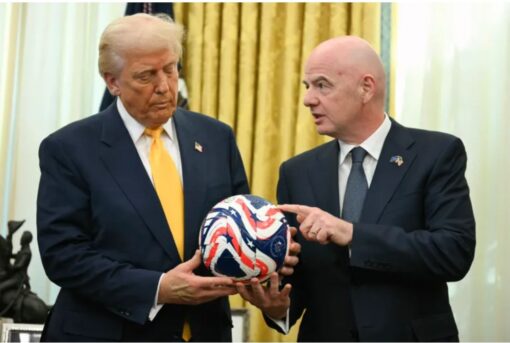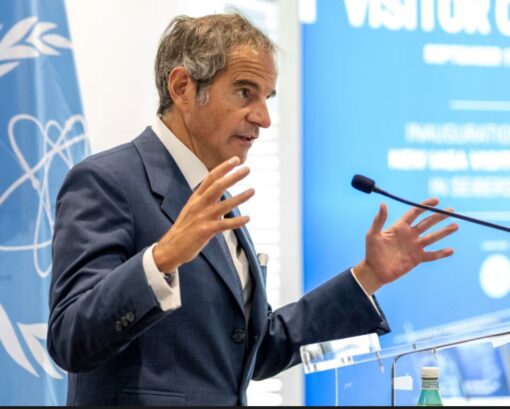The Mediterranean has become the latest stage for rising tensions as Italy and Spain announced they would deploy naval ships to protect the Global Sumud Flotilla, a civilian aid mission sailing toward Gaza that has come under repeated drone attacks.
The decision by two European governments marks a significant escalation in international involvement, underscoring both the high stakes surrounding the flotilla and the mounting scrutiny on Israel’s maritime blockade of Gaza.
Spanish Prime Minister Pedro Sánchez confirmed his country’s involvement while speaking to reporters in New York, where he was attending the United Nations General Assembly.

“The government of Spain demands that international law be complied with and that the right of its citizens to navigate the Mediterranean under safe conditions be respected,” Sánchez declared. He added that Spain would “dispatch a naval vessel from Cartagena with all necessary resources in case it is necessary to assist the flotilla and carry out a rescue operation.”
His words reflected growing alarm after reports emerged that drones had dropped explosive devices on the civilian boats.
Activists onboard described what they called a terrifying sequence of attacks. Several participants reported that drones flew dangerously close to the flotilla, releasing what they believed to be flashbang explosives that detonated near their vessels.
“The noise was deafening, the lights blinding, and for a moment many of us feared the boats had been directly hit,” one passenger explained in a message broadcast from the flotilla.
Organizers condemned the incidents as “an alarmingly dangerous escalation” that risked turning a humanitarian mission into a battlefield. They also accused Israel of deliberately jamming radio frequencies to obstruct communication between the ships.
Italy moved swiftly to join Spain’s commitment, sending a naval frigate to the area. Defense Minister Guido Crosetto called the overnight attacks “unacceptable acts of intimidation against civilians,” while Foreign Minister Antonio Tajani emphasized that Italian citizens were among those onboard, including members of parliament.
“Italian citizens, along with members of parliament and MEPs, are in the flotilla,” the foreign ministry said in a statement. “To ensure their safety, the foreign ministry had already notified Israeli authorities that any operation entrusted to Israeli forces must be conducted in compliance with international law and the principle of absolute caution.”
The flotilla itself has grown into a multinational effort involving participants from 45 countries. The small fleet of about 50 boats carries humanitarian aid intended for Gaza, where the population remains under a tight maritime blockade.
Human rights advocates, lawyers, journalists, and well-known activists, including Swedish climate campaigner Greta Thunberg, are on board. Two Italian lawmakers from opposition parties have also joined, a move that has heightened the political significance of the mission inside Italy.
The flotilla issued a statement denouncing the drone incidents and calling for immediate international intervention. “These repeated attempts by Israel to intimidate flotilla participants will not succeed,” the statement read. “We call upon all UN member states gathered in New York to address these violations and to act in defense of the fundamental rights of civilians at sea.”
The appeal coincided with the annual UN gathering, where the crisis in Gaza remains a central topic.
Greta Thunberg, speaking via a video call from one of the ships, described the flotilla’s determination despite the dangers. “This mission is about Gaza, it isn’t about us. And no risks that we could take could even come close to the risks the Palestinians are facing every day,” she said. According to Thunberg, drones have stalked the flotilla “every night,” adding to the tension and fatigue among passengers.
Activists have drawn parallels between the current journey and past flotillas that attempted to break the blockade, most notably the 2010 Freedom Flotilla, when Israeli forces boarded the Turkish ship Mavi Marmara, resulting in the deaths of ten activists.
That event sparked international outrage and left a lasting scar on maritime activism. This latest mission, however, is larger in scope, more diverse in participants, and now directly backed by the naval forces of European states.
Diplomatic tensions have risen in parallel with the naval deployments. While Israeli officials have not openly claimed responsibility for the drone attacks, flotilla organizers and participants insist that only Israel has both the capacity and the motivation to launch such operations.
Italy and Spain’s moves to send ships signal that Europe is unwilling to see its citizens attacked without protection. “Minister Tajani has asked the Italian Embassy in Tel Aviv to gather information and to reiterate its previous request to the Israeli government to guarantee the absolute protection of the personnel on board,” an Italian government statement said.
Observers note that the intervention of European navies adds new pressure on Israel at a moment when its war in Gaza has already drawn global condemnation. International legal experts argue that the presence of official naval escorts strengthens the flotilla’s claim to lawful navigation.
By contrast, any attempt to obstruct or attack the flotilla in international waters could now risk a direct diplomatic confrontation with European governments.
The humanitarian dimension remains at the heart of the mission. The boats are reportedly carrying medical supplies, food aid, and equipment for civilians in Gaza, where shortages have worsened amid ongoing military operations.
For many participants, the journey is as much symbolic as it is practical. One activist from France explained, “We are here because silence has gone on too long. If governments will not end the blockade, then ordinary citizens must step forward.”
Even as the flotilla presses forward, uncertainty lingers. After the latest drone incidents, passengers described sleeping on deck in shifts, keeping watch for low-flying aircraft.
Communications with families have been sporadic due to the jamming, heightening anxiety ashore. Yet morale remains resilient. “Fear is real, but our commitment is stronger,” said a lawyer from South Africa onboard. “Every threat only proves how much this mission matters.”
For Italy and Spain, their naval deployments are not only humanitarian gestures but also tests of political resolve. Both countries face domestic debates over Middle East policy, with strong public sympathy for Palestinians and growing criticism of Israel’s military conduct.

By taking concrete action, Rome and Madrid are positioning themselves as defenders of international law and human rights, a stance that may carry both risks and rewards within European diplomacy.
The Global Sumud Flotilla now sails with more visibility than ever before. Protected by European warships and watched closely by international media, its voyage has become a powerful symbol of civilian defiance against blockade and war.
What began as a grassroots mission has evolved into a geopolitical flashpoint, drawing in governments and challenging the balance of power at sea.
Whether the flotilla reaches Gaza or is intercepted remains to be seen. But its message is already echoing worldwide: the blockade is under unprecedented challenge, and the determination of those onboard has drawn unexpected allies from across the Mediterranean.
In the words of one activist as the ships pushed forward, “We may not know what tomorrow brings, but we know we cannot turn back.”


